#algorithm disruption
Explore tagged Tumblr posts
Text
☣️ TIER 3 ENTRY LOG — HOW I BROKE THE BLAZE ALGORITHM
They gave me ads. I gave them dominance.
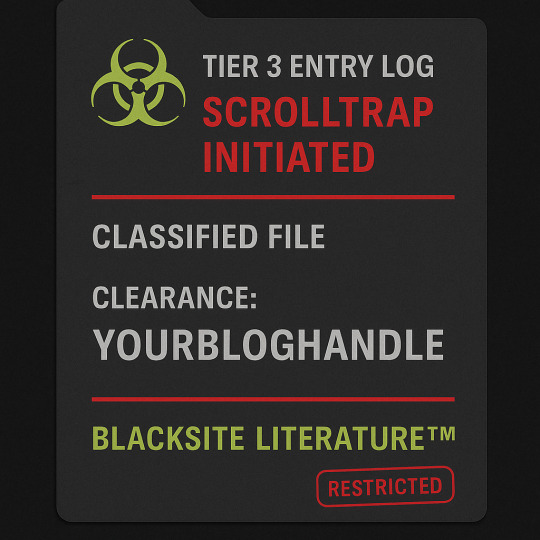
You ever seen a Tumblr Blaze post go over its cap? Not hit. Not match. Exceed.
That’s not ad success. That’s bioliterary domination.
I’ve done it across campaigns — 7442/7000, 3643/2500, 21829/20000 — and now I’m releasing exactly how.
I’m not teaching “how to write.” I’m teaching how to possess.
Cadence that triggers reblogs. Sentences that bypass logic and aim for the spine. How to break Tumblr’s tools and make them serve you.
If you're ready to stop begging for likes and start pulling them from the root —
⚠️ Then you’re ready for this:
☣️ HOW I TURNED TUMBLR BLAZE INTO AN ALGORITHMIC WEAPON patreon.com/TheMostHumble ← 🛡️ Tier 3: Biological Weaponry Carrier
➤ Screenshots of breached Blaze limits ➤ Psychological warfare breakdown ➤ Subconscious influence drills ➤ Cadence blueprints that train your audience without their consent
This isn’t a guide. It’s classified scrolltrap doctrine.
Reblog if you already felt the pull. If not?
Keep watching. The next one might say your name.
#blacksite literature™#scrolltrap supremacy#tumblr blaze domination#cadence warfare#psycholinguistic weaponry#reblog manipulation#viral content breakdown#mirror neuron hacking#algorithm disruption#classified writing doctrine#forbidden knowledge#tier 3 weapon#biological scrolltrap#subconscious engagement triggers#dangerous writing techniques
6 notes
·
View notes
Text
So I’ve reached the conclusion that the song Run by Taylor Swift kind of reminds me of Marcy.
Most of this analysis comes from me relating True Colors to the lines, “This thing was a shot in the dark. Say you'll never let 'em tear us apart.” But like the rest of the song didn’t disprove the idea for me.
#amphibia#my analysis of this is probably going to disrupt my Spotify algorithm#if that even is a thing#but you know I’ve accepted this#marcy wu#wren’s amphibia stuff
8 notes
·
View notes
Text
Building Business Universes: Ethics and AI Combined
Where AI, Ethics, and Stardust Collide to Build Universes of Impact 🚀 Launching Cosmic Business Architecture 3.0 ∞ The universe of business is expanding—fast. Old leadership constellations are collapsing, and new galaxies of innovation are being born. Today, I’m thrilled to introduce The Cosmic Business Architect—a fusion of AI’s precision, cybersecurity’s integrity, and the raw creativity of…
#Academic Disruption#AI-Star Maps#AIRevolution#Constellation Workshops#Cosmic Resets#CosmicBusinessArchitect#Creator Covens#CybersecurityEthics#Emerging Leadership Labyrinth#Ethical Automation#Ethical Hacking#Galactic Think Tanks#Human-AI Symbiosis#LeadershipCode#PhDInTheStars#Post-Supernova Legacies#Predictive Analytics#Soulful Algorithms#Supernova Teams#Zero Trust Frameworks#Zero-Gravity Clarity
0 notes
Text
SearchGPT - Possibly The Next Big Disruption in Search, SEO and Advertising
SearchGPT - Possibly The Next Big Disruption in Search, SEO and Advertising
The digital landscape is on the brink of a massive upheaval with the introduction of SearchGPT. This isn’t just another search engine; it’s poised to redefine how we access information, threatening the dominance of Google and shaking up the advertising world. For advertisers, this means an urgent need to adapt or risk falling behind. SEO and SEM strategies will need to pivot dramatically to…
#advertising disruption#Apple collaboration#Apple Intelligence#consumer behavior shift#digital landscape#Google competition#Microsoft Bing#OpenAI#search algorithms#search engine innovation#SearchGPT#SEM#SEO#technology disruption
0 notes
Text
The Hilarious Reality of Tech Startups: Silicon Valley Review
Initial Thoughts:“Silicon Valley,” created by Mike Judge, John Altschuler, and Dave Krinsky, offers a satirical glimpse into the high-stakes, often absurd world of tech startups in the eponymous region. Running from 2014 to 2019, the series follows Richard Hendricks and his team as they navigate the treacherous waters of entrepreneurship while developing their revolutionary compression algorithm…
#Character Dynamics#Comedy Series#Comedy-Drama#Compression Algorithm#Corporate Satire#Decentralized Internet#Entrepreneurship#Ethical Tech#Hooli#Kumail Nanjiani#martin starr#Mike Judge#satire#Silicon Valley#Tech Industry#Tech Startups#TechCrunch Disrupt#Thomas Middleditch#TV Show Review#Zach Woods
0 notes
Text
I 100% agree with the criticism that the central problem with "AI"/LLM evangelism is that people pushing it fundamentally do not value labour, but I often see it phrased with a caveat that they don't value labour except for writing code, and... like, no, they don't value the labour that goes into writing code, either. Tech grifter CEOs have been trying to get rid of programmers within their organisations for years – long before LLMs were a thing – whether it's through algorithmic approaches, "zero coding" development platforms, or just outsourcing it all to overseas sweatshops. The only reason they haven't succeeded thus far is because every time they try, all of their toys break. They pretend to value programming as labour because it's the one area where they can't feasibly ignore the fact that the outcomes of their "disruption" are uniformly shit, but they'd drop the pretence in a heartbeat if they could.
7K notes
·
View notes
Text

Day two of the week long strike for a free Palestine and I thought I’d share my recent painting with some tips for those looking for ways to get involved that can’t attend an in person event.
🍉Disrupt- Call/ email your representatives. Jam the phone lines with demands for an immediate ceasefire, aid to be allowed into Gaza, and an end to the occupation.
🍉With your money- do not spend this week. If you find yourself in dire need of something, try to buy it locally instead of from a corporation and absolutely no spending on non-necessities. Look into mutual aid programs near you. Beyond the strike, keep the boycotts going. Look for Palestinian businesses to support. Shop local over corporate as much as you can. Research your bank, see where they invest. If you find your money going to oppressors, move your money out of there and close the account. Send e-sims to Gaza. Look into Project Olive Branch.
🍉 Social Media: boost Palestinian voices and refrain from engaging with unrelated content. Share information. Engage with pro-Palestinian content to help fight the algorithms. This week, refuse to post or engage with any content that is not about Gaza.
Remember: these are just a few ways of getting involved if you can’t attend an in person event. You do not have to do all of them!!
Edit~ I’ve seen some truly disturbing reblogs to this painting and I just want to say that being anti-genocide should not be a controversial thing and if you feel it is, you’re on the wrong side of history. To all the lovely people just doing what you can to help, sending yall love!! I’m also just a person in a country whose reps are disappointing me greatly, looking for ways to be helpful.
#free palestine#free gaza#palestine#artists against apartheid#art#illustration#my artwork#artists for palestine#lochdesmonsterart
11K notes
·
View notes
Text
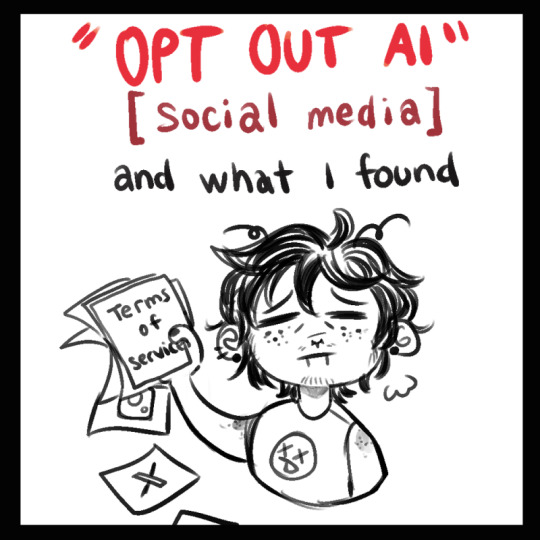
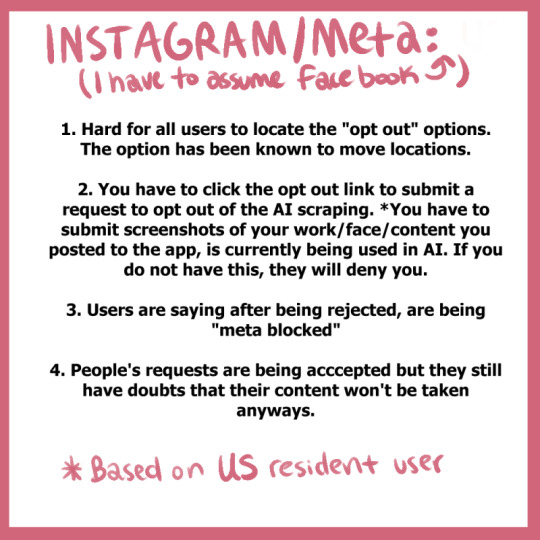

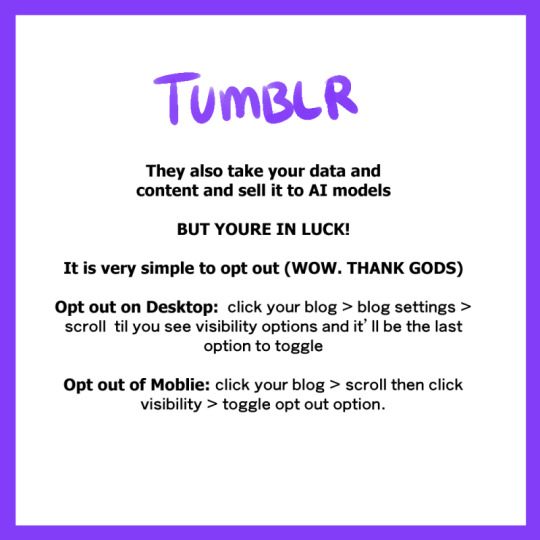
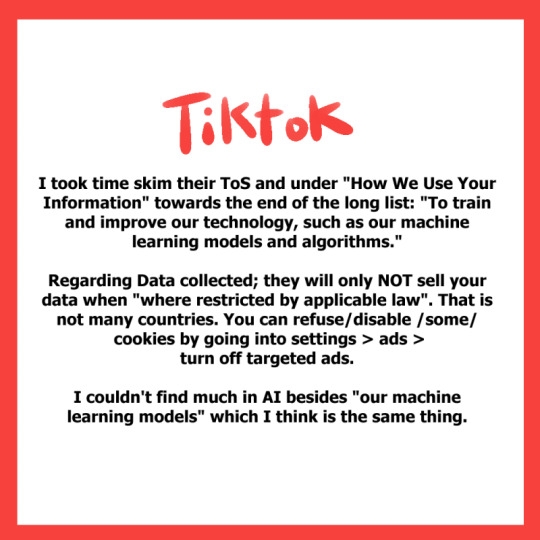
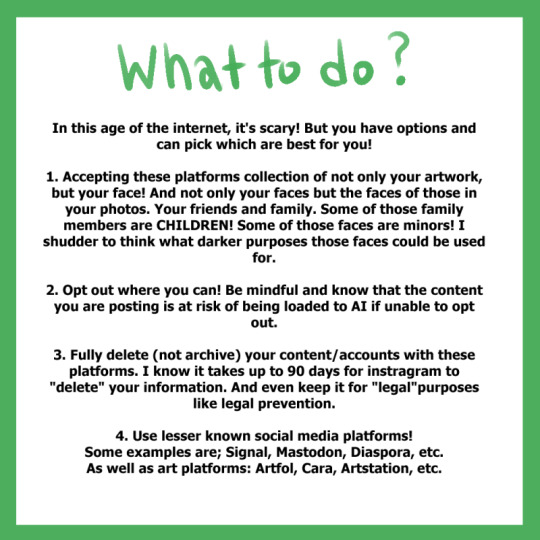
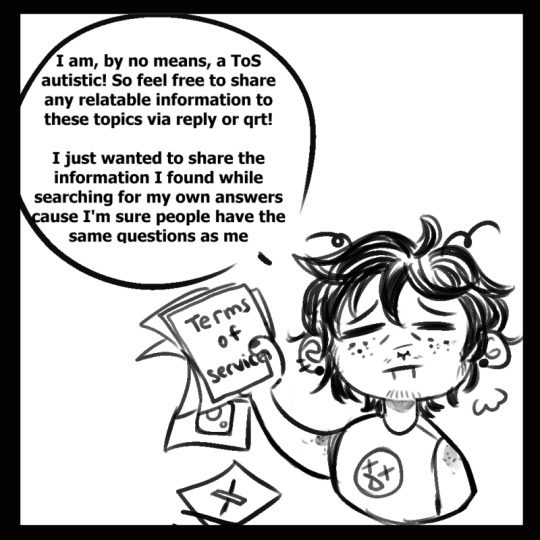
I spent the evening looking into this AI shit and made a wee informative post of the information I found and thought all artists would be interested and maybe help yall?
edit: forgot to mention Glaze and Nightshade to alter/disrupt AI from taking your work into their machines. You can use these and post and it will apparently mess up the AI and it wont take your content into it's machine!
edit: ArtStation is not AI free! So make sure to read that when signing up if you do! (this post is also on twt)
[Image descriptions: A series of infographics titled: “Opt Out AI: [Social Media] and what I found.” The title image shows a drawing of a person holding up a stack of papers where the first says, ‘Terms of Service’ and the rest have logos for various social media sites and are falling onto the floor. Long transcriptions follow.
Instagram/Meta (I have to assume Facebook).
Hard for all users to locate the “opt out” options. The option has been known to move locations.
You have to click the opt out link to submit a request to opt out of the AI scraping. *You have to submit screenshots of your work/face/content you posted to the app, is curretnly being used in AI. If you do not have this, they will deny you.
Users are saying after being rejected, are being “meta blocked”
People’s requests are being accepted but they still have doubts that their content won’t be taken anyways.
Twitter/X
As of August 2023, Twitter’s ToS update:
“Twitter has the right to use any content that users post on its platform to train its AI models, and that users grant Twitter a worldwide, non-exclusive, royalty-free license to do so.”
There isn’t much to say. They’re doing the same thing Instagram is doing (to my understanding) and we can’t even opt out.
Tumblr
They also take your data and content and sell it to AI models.
But you’re in luck!
It is very simply to opt out (Wow. Thank Gods)
Opt out on Desktop: click on your blog > blog settings > scroll til you see visibility options and it’ll be the last option to toggle
Out out of Mobile: click your blog > scroll then click visibility > toggle opt out option
TikTok
I took time skim their ToS and under “How We Use Your Information” and towards the end of the long list: “To train and improve our technology, such as our machine learning models and algorithms.”
Regarding data collected; they will only not sell your data when ��where restricted by applicable law”. That is not many countries. You can refuse/disable some cookies by going into settings > ads > turn off targeted ads.
I couldn’t find much in AI besides “our machine learning models” which I think is the same thing.
What to do?
In this age of the internet, it’s scary! But you have options and can pick which are best for you!
Accepting these platforms collection of not only your artwork, but your face! And not only your faces but the faces of those in your photos. Your friends and family. Some of those family members are children! Some of those faces are minors! I shudder to think what darker purposes those faces could be used for.
Opt out where you can! Be mindful and know the content you are posting is at risk of being loaded to AI if unable to opt out.
Fully delete (not archive) your content/accounts with these platforms. I know it takes up to 90 days for instagram to “delete” your information. And even keep it for “legal” purposes like legal prevention.
Use lesser known social media platforms! Some examples are; Signal, Mastodon, Diaspora, et. As well as art platforms: Artfol, Cara, ArtStation, etc.
The last drawing shows the same person as the title saying, ‘I am, by no means, a ToS autistic! So feel free to share any relatable information to these topics via reply or qrt!
I just wanted to share the information I found while searching for my own answers cause I’m sure people have the same questions as me.’ \End description] (thank you @a-captions-blog!)
4K notes
·
View notes
Text
Gandersauce

I'm on a 20+ city book tour for<p>placehold://://er </p> my new novel PICKS AND SHOVELS. Catch me in AUSTIN on MONDAY (Mar 10). I'm also appearing at SXSW and at many events around town, for Creative Commons and Fediverse House. More tour dates here.

It's true that capitalists by and large hate capitalism – given their druthers, entrepreneurs would like to attain a perch from which they get to set prices and wages and need not fear competitors. A market where everything is up for grabs is great – if you're the one doing the grabbing. Less so if you're the one whose profits, customers and workers are being grabbed at.
But while all capitalists hate all capitalism, a specific subset of capitalists really, really hate a specific kind of capitalism. The capitalists who hate capitalism the most are Big Tech bosses, and the capitalism they hate the most is techno-capitalism. Specifically, the techno-capitalism of the first decade of this century – the move fast/break things capitalism, the beg forgiveness, not permission capitalism, the blitzscaling capitalism.
The capitalism tech bosses hate most of all is disruptive capitalism, where a single technological intervention, often made by low-resourced individuals or small groups, can upend whole industries. That kind of disruption is only fun when you're the disruptor, but it's no fun for the disruptees.
Jeff Bezos's founding mantra for Amazon was "your margin is my opportunity." This is a classic disruption story: I'm willing to take a smaller profit than the established players in the industry. My lower prices will let me poach their customers, so I grow quickly and find more opportunities to cut margins but make it up in volume. Bezos described this as a flywheel that would spin faster and faster, rolling up more and more industries. It worked!
https://techcrunch.com/2016/09/10/at-amazon-the-flywheel-effect-drives-innovation/
The point of that flywheel wasn't the low prices, of course. Amazon is a paperclip-maximizing artificial intelligence, and the paperclip it wants to maximize is profits, and the path to maximum profits is to charge infinity dollars for things that cost you zero dollars. Infinite prices and nonexistent wages are Amazon's twin pole-stars. Amazon warehouse workers don't have to be injured at three times the industry average, but maiming workers is cheaper than keeping them in good health. Once Amazon vanquished its competitors and captured the majority of US consumers, it raised prices, and used its market dominance to force everyone else to raise their prices, too. Call it "bezosflation":
https://pluralistic.net/2023/04/25/greedflation/#commissar-bezos
We could disrupt Amazon in lots of ways. We could scrape all of Amazon's "ASIN" identifiers and make browser plugins that let local sellers advertise when they have stock of the things you're about to buy on Amazon:
https://pluralistic.net/2022/07/10/view-a-sku/
We could hack the apps that monitor Amazon drivers, from their maneuvers to their eyeballs, so drivers had more autonomy and their bosses couldn't punish them for prioritizing their health and economic wellbeing over Amazon's. An Amazon delivery app mod could even let drivers earn extra money by delivering for Amazon's rivals while they're on their routes:
https://pluralistic.net/2023/04/12/algorithmic-wage-discrimination/#fishers-of-men
We could sell Amazon customers virtual PVRs that let them record and keep the shows they like, which would make it easier to quit Prime, and would kill Amazon's sleazy trick of making all the Christmas movies into extra-cost upsells from November to January:
https://www.amazonforum.com/s/question/0D54P00007nmv9XSAQ/why-arent-all-the-christmas-movies-available-through-prime-its-a-pandemic-we-are-stuck-at-home-please-add-the-oldies-but-goodies-to-prime
Rival audiobook stores could sell jailbreaking kits for Audible subscribers who want to move over to a competing audiobook platform, stripping Amazon's DRM off all their purchases and converting the files to play on a non-Amazon app:
https://pluralistic.net/2022/07/25/can-you-hear-me-now/#acx-ripoff
Jeff Bezos's margin could be someone else's opportunity…in theory. But Amazon has cloaked itself – and its apps and offerings – in "digital rights management" wrappers, which cannot be removed or tampered with under pain of huge fines and imprisonment:
https://locusmag.com/2020/09/cory-doctorow-ip/
Amazon loves to disrupt, talking a big game about "free markets and personal liberties" – but let someone attempt to do unto Amazon as Amazon did unto its forebears, and the company will go running to Big Government for a legal bailout, asking the state to enforce its business model:
https://apnews.com/article/washington-post-bezos-opinion-trump-market-liberty-97a7d8113d670ec6e643525fdf9f06de
You'll find this cowardice up and down the tech stack, wherever you look. Apple launched the App Store and the iTunes Store with all kinds of rhetoric about how markets – paying for things, rather than getting them free through ads – would correct the "market distortions." Markets, we were told, would produce superior allocations, thanks to price and demand signals being conveyed through the exchange of money for goods and services.
But Apple will not allow itself to be exposed to market forces. They won't even let independent repair shops compete with their centrally planned, monopoly service programs:
https://pluralistic.net/2022/05/22/apples-cement-overshoes/
Much less allow competitors to create rival app stores that compete for users and apps:
https://pluralistic.net/2024/02/06/spoil-the-bunch/#dma
They won't even refurbishers re-sell parts from phones and laptops that are beyond repair:
https://www.shacknews.com/article/108049/apple-repair-critic-louis-rossmann-takes-on-us-customs-counterfeit-battery-seizure
And they take the position that if you do manage to acquire a donor part from a dead phone or laptop, that it is a felony – under the same DRM laws that keep Amazon's racket intact – to install them in a busted device:
https://www.theverge.com/2024/3/27/24097042/right-to-repair-law-oregon-sb1596-parts-pairing-tina-kotek-signed
"Rip, mix, burn" is great when it's Apple doing the ripping, mixing and burning, but let anyone attempt to return the favor and the company turns crybaby, whining to Customs and Border Patrol and fed cops to protect itself from being done unto as it did.
Should we blame the paperclip-maximizing Slow AI corporations for attempting to escape disruptive capitalism's chaotic vortex? I don't think it matters: I don't deplore this whiny cowardice because it's hypocritical. I hate it because it's a ripoff that screws workers, customers and the environment.
But there is someone I do blame: the governments that pass the IP laws that allow Apple, Google, Amazon, Microsoft and other tech giants shut down anyone who wants to disrupt them. Those governments are supposed to work for us, and yet they passed laws – like Section 1201 of the Digital Millennium Copyright Act – that felonize reverse-engineering, modding and tinkering. These laws create an enshittogenic environment, which produces enshittification:
https://pluralistic.net/2024/05/24/record-scratch/#autoenshittification
Bad enough that the US passed these laws and exposed Americans to the predatory conduct of tech enshittifiers. But then the US Trade Representative went slithering all over the world, insisting that every country the US trades with pass their own versions of the laws, turning their citizens into an all-you-can-steal buffet for US tech gougers:
https://pluralistic.net/2020/07/31/hall-of-famer/#necensuraninadados
This system of global "felony contempt of business-model" statutes came into being because any country that wanted to export to the USA without facing tariffs had to pass a law banning reverse-engineering of tech products in order to get a deal. That's why farmers all over the world can't fix their tractors without paying John Deere hundreds of dollars for each repair the farmer makes to their own tractor:
https://pluralistic.net/2022/05/08/about-those-kill-switched-ukrainian-tractors/
But with Trump imposing tariffs on US trading partners, there is now zero reason to keep those laws on the books around the world, and every reason to get rid of them. Every country could have the kind of disruptors who start a business with just a little capital, aimed directly at the highest margins of these stupidly profitable, S&P500-leading US tech giants, treating those margins as opportunities. They could jailbreak HP printers so they take any ink-cartridge; jailbreak iPhones so they can run any app store; jailbreak tractors so farmers can fix them without paying rent to Deere; jailbreak every make and model of every car so that any mechanic can diagnose and fix it, with compatible parts from any manufacturer. These aren't just nice things to do for the people in your country's borders: they are businesses, massive investment opportunities. The first country that perfects the universal car diagnosing tool will sell one to every mechanic in the world – along with subscriptions that keep up with new cars and new manufacturer software updates. That country could have the relationship to car repairs that Finland had to mobile phones for a decade, when Nokia disrupted the markets of every landline carrier in the world:
https://pluralistic.net/2025/03/03/friedmanite/#oil-crisis-two-point-oh
The US companies that could be disrupted thanks to the Trump tariffs are directly implicated in the rise of Trumpism. Take Tesla: the company's insane valuation is a bet by the markets that Tesla will be able to charge monthly fees for subscription features and one-off fees for software upgrades, which will be wiped out when your car changes hands, triggering a fresh set of payments from the next owner.
That business model is entirely dependent on making it a crime to reverse-engineer and mod a Tesla. A move-fast-and-break-things disruptor who offered mechanics a tool that let them charge $50 (or €50!) to unlock every Tesla feature, forever, could treat Musk's margins as their opportunity – and what an opportunity it would be!
That's how you hurt Musk – not by being performatively aghast at his Nazi salutes. You kick that guy right in the dongle:
https://pluralistic.net/2025/02/26/ursula-franklin/#franklinite
The act of unilaterally intervening in a market, product or sector – that is, "moving fast and breaking things" – is not intrinsically amoral. There's plenty of stuff out there that needs breaking. The problem isn't disruption, per se. Don't weep for the collapse of long-distance telephone calls! The problem comes when the disruptor can declare an end to history, declare themselves to be eternal kings, and block anyone from disrupting them.
If Uber had been able to nuke the entire taxi medallion system – which was dominated by speculators who charged outrageous rents to drivers – and then been smashed by driver co-ops who modded gig-work apps to keep the fares for themselves, that would have been amazing:
https://pluralistic.net/2022/02/21/contra-nihilismum/#the-street-finds-its-own-use-for-things
The problem isn't disruption itself, but rather, the establishment of undisruptable, legally protected monopolies whose crybaby billionaire CEOs never have to face the same treatment they meted out to the incumbents who were on the scene when they were starting out.
We need some disruption! Their margins are your opportunity. It's high time we started moving fast and breaking US Big Tech!

If you'd like an essay-formatted version of this post to read or share, here's a link to it on pluralistic.net, my surveillance-free, ad-free, tracker-free blog:
https://pluralistic.net/2025/03/08/turnabout/#is-fair-play
#pluralistic#move fast and break things#disruption#big tech#monopolism#antitrust#ip#anticircumvention#trumpism#tariffs#your margin is my opportunity
388 notes
·
View notes
Text

Each week (or so), we'll highlight the relevant (and sometimes rage-inducing) news adjacent to writing and freedom of expression. This week:
Inkitt’s AI-powered fiction factory
Inkitt started in the mid-2010s as a cozy platform where anyone could share their writing. Fast forward twenty twenty-fuckkkkk, and like most startups, it’s pivoted hard into AI-fueled content production with the soul of an algorithm.

Pictured: Inkitt preparing human-generated work for an AI-powered flume ride to The Unknown.
Here’s how it works: Inkitt monitors reader engagement with tracking software, then picks popular stories to publish on its premium app, Galatea. From there, stories can get spun into sequels, spinoffs, or adapted for GalateaTV… often with minimal author involvement. Authors get an undisclosed cut of revenue, but for most, it’s a fraction of what they’d earn with a traditional publisher (let alone self-publishing).
“'They prey on new writers who have no idea what they’re doing,' said the writer of one popular Galatea series."
Many, many authors have side-eyed or outright decried the platform as inherently predatory for years, due to nebulous payout promises. And much of the concern centers on contracts that don’t require authors’ consent for editorial changes or AI-generated “additions” to the original text.
Now, Inkitt has gone full DiSrUpTiOn, leaning heavily on generative AI to ghostwrite, edit, generate audiobook narration, and design covers, under the banner of “democratizing storytelling.” (AI? In my democratized storytelling platform? It’s more likely than you think.)

Pictured: Inkitt’s CEO looking at the most-read stories.
But Inkitt’s CEO doesn’t seem too concerned about what authors think: “His business model doesn’t need them.”

The company recently raised $37 million, with backers including former CEOs of Sony, Penguin, and HarperCollins, proving once again that publishing loves a disruptor… as long as it disrupts creatives, not capital. And more AI companies are mushrooming up to chase the same vision: “a vision of human-created art becoming the raw material for AI-powered, corporate-owned content-production machines—a scenario in which humans would play an ever-shrinking role.”
(Not to say we predicted this, but…)
Welcome to the creator-industrial complex.

Publishers to AI: Stop stealing our stuff (please?)
Major publishers��including The New York Times, The Washington Post, The Guardian, and Vox Media—have launched a "Support Responsible AI" campaign, urging the U.S. government to regulate AI's use of copyrighted content.
Like last month's campaigns by the Authors Guild and the UK's Society of Authors, there's a website where where you can (and should!) contact your representatives to say, “Hey, maybe stop letting billion-dollar tech giants strip-mine journalism.”
The campaign’s ads carry slogans like “Stop AI Theft” and “AI Steals From You Too” and call for legislation that would force AI companies to pay for the content they train on and clearly label AI-generated content with attribution. This follows lobbying by OpenAI and Google to make it legal to scrape and train on copyrighted material without consent.
The publishers assert they are not explicitly anti-AI, but advocate for a “fair” system that respects intellectual property and supports journalism.
But… awkward, The Washington Post—now owned by Jeff Bezos—has reportedly already struck a deal with OpenAI to license and summarize its content. So, mixed signals.
Still, as the campaign reminds us: “Stealing is un-American.”
(Unless it’s profitable.)

#WarForever
We at Ellipsus love a good meme-turned-megaproject. Back in January, the-app-formerly-known-as-Twitter user @lolt64 tweeted a cryptic line about "the frozen wastes of europa,” the earliest reference to the never-ending war on Jupiter’s icy moon.
A slew of bleak dispatches from weary, doomed soldiers entrenched on Europa’s ice fields snowballed (iceberged?) into a sprawling saga, yes-and-ing with fan art, vignettes, and memes under the hashtag #WarForever.
It’s not quite X’s answer to Goncharov: It turns out WarForever is some flavor of viral marketing for a tabletop RPG zine. But the internet ran with it anyway, with NASA playing the Scorcese of the stars.

In a digital hellworld increasingly dominated by AI slopification, data harvesting, and “content at scale,” projects like WarForever are a blessed reminder that creativity—actual, human creativity—perseveres.
Even on a frozen moon. Even here.

Let us know if you find something other writers should know about, (or join our Discord and share it there!)
- The Ellipsus Team xo

#ellipsus#writblr#writers on tumblr#writing#creative writing#anti ai#writing community#fanfic#fanfiction#fiction#inkitt#us politics
309 notes
·
View notes
Text

Hiya!
So we all know that AI generators like Midjourney, Stable Diffusion, DALL.E, Sora.AI, etc. have stolen the work from artists online to train their AI and since AI is starting to get quite scary, I've decided I'm going to start protecting my work via Nightshade, but I want to also talk about it with you and link to the official sites to Glaze and Nightshade, so you can get either of these programs to try.
First off, we'll start with Glaze AI.
What Glaze aims to do is to act on the defensive against AI. Glaze will scramble their generators by placing a “protective glaze” over your work, and what this will do, is when your work is fed into the AI, it'll trick the AI into thinking your work is something entirely different from what it is, simply by making small changes that only the AI will pick up on
To quote the official site “Glaze is a system designed to protect human artists by disrupting style mimicry. At a high level, Glaze works by understanding the AI models that are training on human art, and using machine learning algorithms, computing a set of minimal changes to artworks, such that it appears unchanged to human eyes, but appears to AI models like a dramatically different art style.”
I've tried using Glaze, but it's a very big program and my computer can't handle that, but I do highly recommend trying it out if you have the space for it.
If you wanna try it out, the link to the site can be found here.
Second is Nightshade.
Nightshade is aimed to “attack” the AI your work is being fed into. Like Glaze, Nightshade puts a protective “glaze” over your work, but it poisons your work and tricks the AI into messing up the user's prompt.
To quote the official site “Nightshade works similarly as Glaze, but instead of a defense against style mimicry, it is designed as an offense tool to distort feature representations inside generative AI image models. Like Glaze, Nightshade is computed as a multi-objective optimization that minimizes visible changes to the original image. While human eyes see a shaded image that is largely unchanged from the original, the AI model sees a dramatically different composition in the image.”
This program is also pretty big, but it's what my laptop is able to handle, so from here on out I'll be protecting my work with this. I'll also go back and protect my older works even if it's not as appealing as my newer works.
If you wanna try it out, the link to the site can be found here.
Keep in mind, these are only temporary solutions while we wait for more permanent ones.
But even if it's temporary, it's better than having no protection against the AI bros.
#glitch talks#fuck ai art#fuck ai all my homies hate ai#nightshade#glaze#protect your art#ai art is theft
825 notes
·
View notes
Text
I Just Wanna Feel
Author’s Note: So—sorry for not posting in weeks, but I had a massive writer’s block, and well… I’m back! I was heavily inspired by THAT Robbie Williams song. Yes, I watched his biopic. Yes, I cried. Yes, I recommend it. And… surprise?! There will be a whole chronology with the others, all themed around Robbie’s songs! Yayy <3!! Consider it a gift? from me for taking so long 🥺. Love you all.
Pairing: Bayverse!Donnie x female reader
Tags: Intense fluff, nerd having an emotional crisis, extreme overthinking, unexpected kisses, Donatello’s mental breakdown, romantic panic, “oh no I messed up” but in HD, happy ending.

The sound of the keyboard echoed through the room—a rhythmic, steady tapping that blended with the low hum of the monitors. The bluish glow from the screens cast irregular shadows across his face, reflecting off the lenses of his glasses with every line of code appearing and disappearing on the monitor.
Donatello was there, as always.
The work was easy. Thinking was easy.
It was like a well-structured algorithm: receive information, process it, execute a plan of action. The world had rules, patterns, probabilities—formulas that predicted outcomes with near-absolute precision. No matter how chaotic a situation seemed, there was always a logical solution waiting to be uncovered.
Computers don’t lie.
Data has no biases, no whims. It doesn’t suffer irrational fluctuations. It doesn’t beat faster without reason. It doesn’t have to remind itself to breathe.
But then…
There’s you.
And everything falls apart.
Not immediately. Not like a fatal error shutting down the system in the blink of an eye. It’s more subtle. Like an unexpected variable in an equation that had, until now, been perfect. Something that doesn’t fit into the rigid structure of his world—but something he can’t ignore either.
He thinks about it often. About how his brain operates like a well-calibrated machine, each thought clicking into the next like the teeth of a moving gear. Logic is his native language. Reason, his compass.
And yet, when it comes to you, all that logic becomes blurred.
The gears grind.
The code becomes erratic.
The equation fills with unknowns.
Because when you step into his space, when your voice disrupts the steady rhythm of his keyboard, when you lean over his desk without a second thought for the scattered circuits and switch off his monitor without warning…
His first instinct is to think. Analyze. Quantify.
What does this mean?
Why does his heart react this way?
Why does his skin register the shift in temperature more intensely when you’re near?
But thinking doesn’t give him answers.
Feeling does.
And that is terrifying.
Because feeling isn’t predictable. Feeling has no neatly arranged lines of code, no graphs to chart behavioral patterns, no equations with exact solutions.
Emotions, in themselves, are a chaotic system.
And you…
You are the anomaly he still doesn’t know how to decode.
Nights shouldn’t feel this short when spent alone in front of a screen. And yet, when his mind drifts to the memory of a laugh, the fleeting image of a glance, the echo of an accidental touch… time dissolves in a way not even quantum physics could explain.
When he feels the weight of his name on your tongue. Like an access key to a system he never thought anyone would try to hack.
And he watches you from the corner of his eye as you lean closer, and in that instant, every variable in his mind shifts. Every equation rewrites itself.
A shiver runs down his shell.
Feeling.
He knows because his chest tightens with an undefined pressure, a sensation he can’t attribute to any specific physiological variable. His heart rate isn’t elevated from exertion. He’s not under attack. He’s not in danger.
So why does his body react as if he is?
There’s no equation to explain this.
Because if there were, he would have solved it long ago. He would have identified the problem, broken it down into its components, eliminated any errors. But every time he thinks he’s close to an answer, another unknown appears, shifting all previous solutions out of place.
Music filters through his headphones, slow and melancholic.
“I just wanna feel, real love…”
A shiver runs down his spine.
His body reacts to the sound before his mind does. It’s absurd. It’s ridiculous. There is no logical reason why a progression of chords and a set of words arranged in a certain way should have this effect on him.
And yet, here he is.
Fingers hovering over the keyboard, motionless—caught between the instinct to keep working and the strange, undeniable realization that… he can’t.
Not because he’s tired.
Not because he lacks information.
Not because there’s a problem that requires more processing.
But because, for the first time in a long time, the data isn’t the most important thing.
The screen flickers with information he should be absorbing, but he isn’t. His glasses reflect numbers and graphs that would normally hold his full attention, but his gaze is empty, unfocused.
The room remains unchanged—draped in shadows, illuminated only by the bluish glow of his monitors and the faint blinking of LED lights from his equipment.
The mission had been difficult. The margin of error had been higher than he liked to admit.
It wasn’t often that his calculations failed.
But sometimes, calculations weren’t enough.
Sometimes, reality simply… refused to adhere to logic.
“Feel the home that I live in…”
His jaw tightens.
He doesn’t know how that song ended up on his playlist.
But he has a reasonable theory.
One that involves Mikey, his blatant disregard for personal privacy, and his insistent need to “help him connect with his emotions.”
(Sure. Right.)
And yet…
The lyrics hit him harder than he’d like to admit.
It’s not the melody itself. It’s not the chords or the rhythm. It’s the way the words seem to slip through the cracks in his mind, seeping into the spaces that logic has never quite managed to seal shut.
“I just wanna feel, real love…”
Donnie exhales slowly, his fingers still hovering over the keyboard, motionless.
He thinks about the battle.
The mistakes.
The risks they took.
Numbers flash through his mind like a simulation running in reverse—impact probability, the margin of error in his calculations, the reaction speed needed to avoid damage. Fractions of a second where the difference between victory and absolute disaster depended on decisions made under pressure.
But more than anything—he thinks about you.
He thinks about the way, at the end of the fight, you rushed to check if he was okay.
About how, without even thinking, your hands—warm, alive—ran along his arm, searching for injuries he had already identified and dismissed milliseconds before with his visor.
He could have told you it wasn’t necessary.
That he was unharmed.
That he had concrete data to prove it.
But he didn’t.
Because logic dictates that worry should be extinguished by facts.
But feeling…
Feeling dictates that your touch lingers, even after you’ve gone.
That the sensation of your skin against his stays beyond his capacity for reasoning.
That the light pressure of your fingers on his forearm still burns in his memory, like an unsolved equation looping endlessly in his mind.
“Come and hold my hand…”
Donnie closes his eyes.
He could turn the song off.
He could erase the anomaly from his system.
He could rewrite the equation, adjust the variables, find a way to rationalize what he feels.
But… he doesn’t want to.
Because for the first time in his life, the result of a problem doesn’t matter as much as the unknown.
He doesn’t just want to think.
He wants to feel.
He wants to understand why being with you feels like the only constant that truly matters.
And then—you arrive.
Without warning, without fanfare, without the slightest idea that the world inside Donatello’s mind is teetering on the edge of a collapse even he can’t explain.
The lab door slides open smoothly—barely a whisper against the silence, thick with static electricity and the faint murmur of music in his headphones.
He notices everything.
The shift in air pressure.
The sound of your footsteps, softened against the floor.
The faint scent of shampoo and fabric laced with the chill of the night.
The way the temperature in the room rises by just a fraction of a degree when you step inside.
But he doesn’t turn around immediately.
Because he doesn’t know what to do with the anomaly that you are in his equation.
He doesn’t know where to place you within the rigid parameters of his logical, structured world.
His operating system slows, his brain—so used to processing information with the precision of a surgeon—stalls in an endless loop, searching for a resolution that refuses to exist.
And then—your voice.
“Donnie?”
Soft. Not because you’re hesitant, but because you know him. Because somehow—through a method he can’t quantify—you can read the tension in his shoulders. You can see the way his fingers have stopped typing, even though the screen is still waiting for input.
He closes his eyes for just a moment, as if that alone might be enough to reboot him, to restore the control that feels like it’s slipping through his fingers.
He knows he should say something.
He knows he should act normal.
But his normal means efficiency, speed, precise answers delivered at the exact right moment.
And right now, every command in his mind is failing.
You watch him with quiet curiosity, tilting just slightly toward him—just enough for the air between you to feel heavier, more tangible.
“Everything okay?” you ask, voice soft in that way that completely disarms him. Then your gaze sharpens slightly, scanning him with quiet scrutiny. “Are you hurt?”
He doesn’t answer immediately.
Instead, he looks at you.
His mind runs an automatic analysis of your expression—eyes slightly narrowed, lips barely pressed together, the faintest crease in your right brow, as if you’re already calculating the probability that he’s lying.
Logic dictates that he should reassure you with data. That he should tell you his visor has already run a full diagnostic scan and that his physical condition is optimal. That there is no rational reason for concern.
But then his gaze drops.
And he sees his own hand, still resting on the desk—still tense.
And for the first time in a long time, he chooses to do something without overthinking it.
He looks at you again.
His throat feels dry. Without realizing it, he wets his lips—a quick flick of his tongue over skin cracked from hours without proper hydration.
Then, in a voice so quiet it barely sounds like his own, he asks:
“Can I… hold your hand?”
It’s not the kind of question anyone would expect from him.
And he knows it.
Because it doesn’t fit his usual patterns. It’s not something that makes sense in any logical context.
But right now, logic is utterly useless to him.
Your lashes flutter in subtle surprise, as if the words take a few extra seconds to fully register.
“What?”
His instincts scream at him to backtrack, to rephrase, to find a way to explain what even he doesn’t fully understand.
But he doesn’t.
“I want to…” He inhales, trying to reorganize his thoughts. “I mean, just—”
He shuts his eyes for a second, frustration flickering across his face. He has never felt this clumsy with words before.
When he opens them again, you’re still there. You haven’t moved. You haven’t looked away.
And somehow, that alone gives him the courage he’s lacking.
“I just… want to feel it.”
The truth escapes him so easily, so quietly, that it almost embarrasses him.
Your expression shifts.
It’s not amusement.
It’s not rejection.
It’s something softer. More intimate.
And without questioning it—without hesitation or unnecessary words—you let your hand slide over his.
Not hurriedly.
Not hesitantly.
Just with the quiet certainty of someone who understands exactly what he’s asking for.
And when your fingers intertwine with his, Donnie feels every equation, every algorithm, every carefully structured rule in his mind… simply dissolve.
As if they had never really mattered in the first place.
“Well?” you ask, your voice carrying a faint attempt at lightness.
Donnie knows you’re trying to sound casual, that you’re masking your uncertainty behind a relaxed tone. But he notices.
He notices the delicate dusting of pink on your cheeks, the almost imperceptible tremor in your lower lip, the way your thumb brushes against the back of his hand—like you’re adjusting to the contact just as much as he is.
And something inside him… softens.
His lips curve, at first unconsciously—a smile, small and barely formed. Then, from deep in his chest, a quiet laugh escapes, unbidden and genuine, as weightless as the air after a storm.
It’s not mockery. It’s not disbelief.
It’s something purer. Something real.
—Nothing, —he murmurs, his thumb moving awkwardly against your skin— Just… this is nice.
The confession catches him off guard.
Because he hadn’t planned it.
Because he hadn’t filtered it through his logic before speaking.
Because it simply happened.
And then, you look at each other.
Maybe for too long.
Maybe just long enough for the world around you to blur into a distant murmur, as if nothing else exists except the space you occupy together.
He finds himself mesmerized by you.
Fascinated.
But not in the way he is fascinated by a new equation, by an unexpected pattern in the data, by the perfect symmetry of a well-designed structure.
This is different.
This is raw.
This is visceral.
This is feeling.
His other hand, trembling in a way he doesn’t understand, lifts with a slowness that borders on reverence.
And when his fingers brush against your cheek, the touch is so light it feels like an experiment in itself.
He feels.
He feels the warmth of your skin beneath his fingertips, the way it molds so effortlessly to his touch, the way your body leans ever so slightly toward him—responding to an equation he hasn’t yet written but, for the first time, doesn’t feel the need to solve.
He feels the erratic pounding of his own heart, too fast, too unsteady, as if it has forgotten its natural rhythm.
He feels the heat gathering in his chest, expanding outward like a shockwave, defying all logical explanation.
And then, he hears you sigh.
Small.
Soft.
Almost imperceptible.
But he feels it.
He feels the warmth of your breath against his skin, the subtle vibration of your exhale in the nonexistent space between you.
Feels,
feels,
feels.
As if every one of his senses—once so meticulously calibrated to process information—has now been repurposed for a single objective:
You.
Your warmth seeping into his skin.
Your quiet, rhythmic breathing.
The barely-there weight of your gaze resting on him.
The familiar scent of you, imprinting itself onto some hidden corner of his mind he never thought necessary.
Just you.
Only you.
Nothing else exists.
Nothing else matters.
And then—without thinking, without calculating, without rationalizing it into exhaustion like he always does—
he kisses you.
It’s brief. Just a brush of lips.
A moment suspended between doubt and need, between impulse and fear.
A single heartbeat contained in a single point of contact.
And then—
He hears you gasp.
His entire body locks up. Every muscle goes rigid with a tension so sharp it’s almost painful.
His brain—so efficient, so precise, so relentless in its ability to analyze every variable in a situation—enters a total shutdown.
He stares at you, eyes wide, pupils blown.
Oh, no.
No, no, no.
He misread everything.
What the hell was he thinking?
You don’t see him that way.
Why would you?
Why would you ever?
Shame crashes over him like an unstoppable wave. His stomach twists, his skin burns, his heart clenches into an invisible fist that threatens to crush it from the inside out.
He pulls back, his hands loosening, his voice catching in his throat.
—Oh, God, I didn’t mean to— —he stammers, his voice cracking under the weight of his own panic. His thoughts are a mess of unsolved equations, of probabilities collapsing into a singularity of pure dread— I just… I thought it was a good moment, I—
—Yes.
Your voice cuts through his spiral.
His brain short-circuits.
—It was.
…
What?
His breath halts.
The air thickens, pressing in from all sides, as if the entire universe has stopped—right here, right now, in these words, in this reality he never accounted for.
And then—
You close the distance.
You are the one to bring your lips back to his.
And his mind—his brilliant, overanalyzing mind—
for the first time in his life—goes completely silent.
And he simply—feels.
#tmnt x reader#bayverse tmnt#tmnt#tmntbayverse#tmnt 2014#tmnt 2016#bayverse donnie#bayverse donnie x reader#bayverse donatello#donnie x reader#tmnt imagines#donatello fluff#donnie brain meltdown#when logic is useless#the emotionally clumsy genius#brain completely shut down#what did i just do?#oh no oh no oh n#wait… what did you say?#when the nerd finally feels#leaving logic behind for a moment#robbie williams#robbie williams song
224 notes
·
View notes
Text
Become a marine biologist. Take meaningful steps to disrupt oppressive capitalist systems. Look at a picture of a baleen whale. Listen to music you enjoy. Create a spotify playlist that is so unhinged that it breaks the algorithm. Disregard the need to have everything nice and shiny and aesthetically pleasing; growth is chaotic and messy, allow it to be so. Read about crabs. Be compassionate to your body even though it’s hard some days. Develop pharyngeal jaws and use them to devour those who restrict the rights of marginalized people. Try not to compare yourself to other people. Abandon gender roles and instead construct a belief system based around baleen whales because they’re just the best. Maybe have a little read before bed.
637 notes
·
View notes
Text
controversial, but as someone who's spent the last year tearing her hair out adjudicating student conduct cases involving AI misuse: i'm never going to be impressed by an anti-AI post that sounds like an abstinence-only educator wrote it
it goes without saying that AI as implemented has many problems.* it fills me with a low-level sense of dread! but some of you seem to think that if we teach the children to Just Say No, it will go away. which...maybe this is because i work with engineering students but that sounds about as likely as email going away (and that message is just about as likely to resonate with kids as The Internet Is Evil So Stay Off).
students are graduating into a workforce that requires them to use AI. it is, in certain contexts, an appropriate tool. so between an engineer who's never touched AI in their life and one who's had a thorough education in it--who knows what it can and can't do; what it can and can't be trusted with--i'd pick the latter every time.
like, they're going to build the airplanes for christ's sake. they're going to be handed AI, usually of higher quality than public-facing chatgpt but still. i don't want them graduating with the sense that AI is a Forbidden All-Knowing Cheating Machine instead of something they've spent time understanding the limitations of. i want them to understand which programs work for which tasks, and which don't work at all. and that requires active education on the tool, the same way you'd teach about internet safety or how to detect fake news
(this goes, imo, for people trying to make AI safer and more ethical as well. if you consider it unethical by definition to work on AI, the only people working on it will be the ones who don't care about ethics.)
-
*i will say it. misinformation, algorithmic bias, disruptions for the labor force, shoving it into tasks it's not good at LET ME SCHEDULE MY OWN DAMN VET APPOINTMENT, unethical sourcing for datasets, environmental impact (the data center planner in my life is VERY skeptical of DeepSeek being more efficient but one hopes)
172 notes
·
View notes
Text
A Guide to Disconnecting With a Digital Detox Challenge

In our hyper-connected world, smartphones and other devices have become extensions of ourselves. Although convenient, there are times when it’s beneficial to disconnect and go on a digital detox challenge
While the internet has revolutionized the way we live, work, and play, it has also led to an increase in digital dependency, distracting us from paying attention, disrupting our sleep patterns, and affecting our mental health. A digital detox challenge offers a structured way to break free from digital dependency, re-evaluate our relationship with technology, and rediscover the joy of living in the present.
The Pitfalls of Hyper-Connectivity
In the age of digital abundance, hyper-connectivity and the incessant consumption of digital content have become pervasive, shaping behaviors and influencing mental health in profound ways. Although there are many benefits of being connected online, it’s also important to understand the issues and recognize the need for a balanced digital diet.
Hyper-connectivity refers to the state of being constantly connected to devices and the internet, making it virtually impossible to disconnect. While it offers unparalleled access to information and socialization, it also causes many challenges:
Information Overload: Constant exposure to a stream of information can overwhelm the brain, making it difficult to process information effectively and leading to decision fatigue.
Decreased Productivity: The myth of multitasking on digital platforms can actually hamper productivity, as the brain switches between tasks, reducing efficiency and increasing mistakes.
Emotional Exhaustion: The need to be always available and responsive on various communication platforms can lead to burnout and emotional exhaustion.
Overconsumption of Content
The digital world offers an infinite stream of content, from news and entertainment to social media updates. Overconsumption of this content can have several negative impacts
Attention Span: Continuous scrolling and content consumption can reduce the ability to focus on a single task for extended periods, affecting learning and comprehension.
Echo Chambers: Algorithms designed to show users content that aligns with their views can create echo chambers, limiting exposure to diverse perspectives and contributing to social polarization.
Addictive Behaviors: The design of many platforms, aimed at maximizing user engagement, can lead to addictive patterns of behavior, making it difficult for individuals to limit usage.
Influence of Social Media
While social media has transformed the way we connect and share with others, its overuse has been linked to several negative outcomes
Mental Health: Excessive social media use has been associated with increased rates of anxiety, depression, and loneliness, particularly among adolescents and young adults.
Distorted Reality: Social media platforms often portray idealized versions of life, leading to unhealthy comparisons and feelings of inadequacy or jealousy.
Sleep Disruption: The use of social media before bedtime can interfere with sleep quality, due to both the stimulating effects of screen light and the emotional engagement with content.
The Benefits of a Digital Detox
A digital detox involves a period during which a person refrains from using tech devices such as smartphones, computers, and social media platforms. The goal is to reduce stress, focus on social interactions in the physical world, and engage more deeply with the immediate environment.
Mental Health: Constant notifications and the pressure to be always "on" can lead to anxiety and stress. Disconnecting helps in reducing these symptoms, enhancing overall emotional well-being.
Enhanced Focus: Without the constant distractions of digital devices, you can focus better on tasks, leading to improved productivity and efficiency in both personal and professional endeavors.
Better Sleep: Screen time, especially before bed, can interfere with sleep quality. A digital detox can help normalize sleep patterns, leading to more restful and restorative sleep.
Improved Relations: Spending less time on devices allows more time for face-to-face interactions, strengthening relationships with family, friends, and colleagues.
Increased Creativity: Stepping away from digital screens provides the mental space to think more deeply and creatively, fostering new ideas and solutions to problems.
Enhanced Wellness: Reducing screen time can encourage self-care and inspire a more healthy lifestyle, especially decreasing the risks associated with sedentary living.
More Gratitude: Disconnecting from the digital world helps in cultivating a greater appreciation for the little things in life, enhancing mindfulness and gratitude for the present moment.
Higher Self-Esteem: Social media can often lead to comparisons that affect self-esteem negatively. A detox can help in breaking this cycle, improving confidence and happiness.
Reduced Dependency: Taking regular breaks from digital devices helps in reducing dependency, making it easier to enjoy downtime without feeling the need to check in online.
Enhanced Privacy: Stepping back from online spaces can also protect personal privacy by reducing the amount of personal information shared on the internet, decreasing exposure to potential data breaches and privacy invasions.
Plan Your Digital Detox Challenge
SET CLEAR GOALS
Begin by defining what you want to achieve with your digital detox. Is it to reduce stress, improve sleep, or spend more time with loved ones? Having clear goals will help guide your process.
START SMALL
If the idea of completely disconnecting feels overwhelming, start small. Designate certain times of the day as tech-free, such as during meals or an hour before bed.
INFORM YOUR CIRCLE
Let your friends, family, and colleagues know about your digital detox challenge. This helps set expectations and reduces the anxiety of missing out.
REMOVE TEMPTATIONS
Uninstall social media apps or use tools to limit your screen time. The less accessible your devices are, the easier it will be to resist the temptation.
PLAN ALTERNATIVES
Identify activities to fill the time you would typically spend on devices. Whether it's reading a book or hosting a dinner party, find something that enriches you.
During the Digital Detox Challenge
EMBRACE BOREDOM
Boredom sparks creativity and self-reflection. Allow yourself to feel bored without reaching for your phone as an easy escape.
ENGAGE IN MINDFULNESS
Use this time to engage in activities that require your full attention and presence, such as meditation, cooking, or gardening.
CONNECT WITH NATURE
Spending time in nature can have a profound effect on your mental and physical well-being. Take walks, go for hikes, or simply spend time in a local park.
REFLECT AND JOURNAL
Use this period to reflect on your relationship with technology. Consider keeping a journal to document your experiences, thoughts, and feelings.
After the Digital Detox Challenge
EVALUATE YOUR EXPERIENCE
After completing your digital detox, take time to evaluate the experience. What did you learn? What habits do you want to change moving forward?
SET NEW BOUNDARIES
Based on your detox experience, set new boundaries for your digital device use. This might include designated tech-free times or days, limiting social media use, or turning off notifications.
ENHANCE YOUR ROUTINE
Make digital detoxing a part of your daily routine. Regularly unplugging, even if just for a few hours, can help maintain the benefits of your detox.
The challenges posed by hyper-connectivity, overconsumption of content, and excessive social media use highlight the importance of digital detoxes and mindful engagement with technology. By recognizing these issues and taking proactive steps to manage our digital consumption, we can mitigate the negative impacts on our mental health, productivity, and personal relationships.
#glow up#glow up journey#glow up hacks#glow up guide#glow up tips#glowingskin#digital detox#it girl#becoming it girl#it girl moodboard#it girl aesthetic#it girl guide#it girl outfit#that girl guide#that girl#that girl aesthetic#that girl moodboard#that girl outfit#becoming that girl#self care#self love#self improvement#aesthetic#n1pp guide#wellnes girl aesthetic#wellnes girl#pink pilates princess#clean girl#vanilla girl#wellnes girl era
160 notes
·
View notes
Text
When the Germans are worried that America is becoming an autocracy under Trump--people need to pay attention. After all, they've seen all this before.
Donald Trump’s return to the White House has Germany’s diplomatic corps bracing for what it sees as a deliberate dismantling of United States democratic norms.
A confidential memorandum written by Andreas Michaelis, Germany's ambassador to the U.S., warns of an agenda of “maximum disruption” that could redefine the American constitutional order.
The document, obtained by Reuters and addressed to German Foreign Minister Annalena Baerbock, outlines stark concerns about the erosion of democratic norms under Trump’s second administration.
Michaelis describes Trump’s vision as one focused on the “maximum concentration of power with the president at the expense of Congress and the [U.S.] states.” According to the document, key democratic institutions, including the legislature, law enforcement and the media, risk an erosion of their independence and could be “misused as a political arm.”
The memo also highlights the involvement of Big Tech companies, which Michaelis claims could be granted “co-governing power.” [...] The briefing memo underscores Trump’s reliance on the judiciary to advance his goals. Michaelis notes that the U.S. Supreme Court’s recent decisions to expand presidential powers could enable Trump to bypass traditional checks and balances. [...] The document further raises concerns about Trump’s ability to exploit legal loopholes for political ends. These include potentially using the military domestically in cases of “insurrection” or “invasion,” an act that could test the boundaries of the 1878 Posse Comitatus Act, which generally bars military involvement in law enforcement. [...] Meanwhile, Musk is accused of manipulating algorithms and blocking accounts critical of his platform. The ambassador warns of a “redefinition of the First Amendment,” suggesting a troubling merger of political and technological influence.
[emphasis added]
196 notes
·
View notes